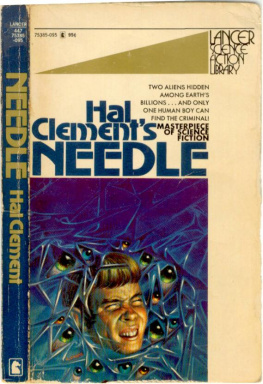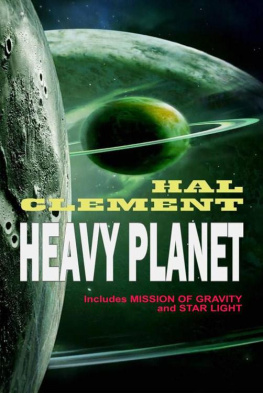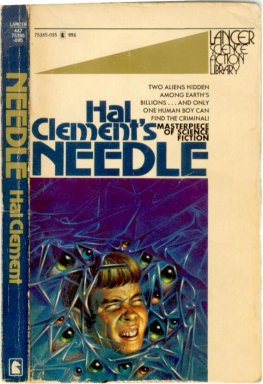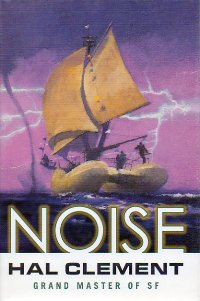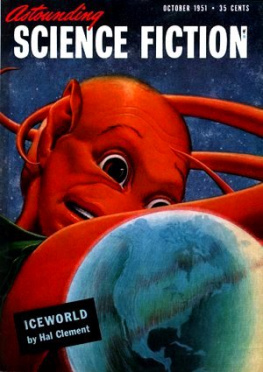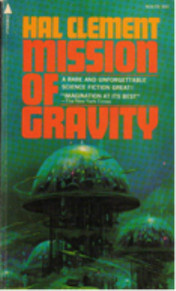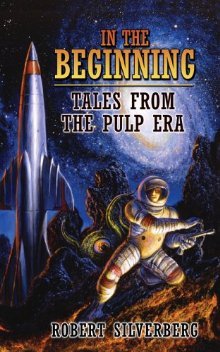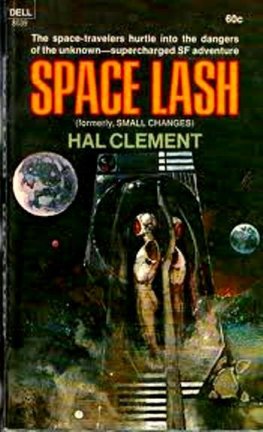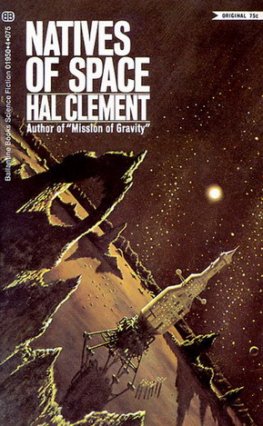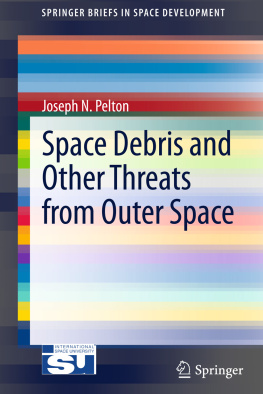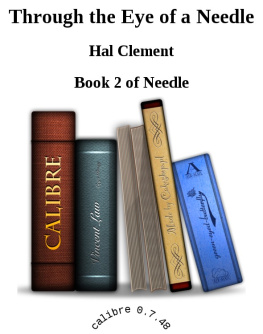Annotation
Two alien races lived under a single sun, someplace across the galaxy, sharing their world sharing life itself. For they lived together in a partnership more perfect than any other known to the intelligences of the galaxy. Together, the two races became one, each deriving from the other that which made him greater than his individual self. Host and symbiote, they lived together, shared together two bodies in one. For the one race was symbiotic, amorphous, able to enter the body of the other.
Then one symbiote turned Criminal, and his race could not rest until he was tracked down. But the Criminal could hide in any living thing and on Earth there were over two billion humans alone!
HAL CLEMENT blends a masterpiece of science fiction with a story of pure detection to produce his best novel, and one of the most famous s-f novels of the past quarter-century.
Hal Clement
Needle
Chapter I. CASTAWAY
EVEN ON THE earth shadows are frequently good places to hide. They may show up, of course, against lighted surroundings, but if there is not too much light from the side, one can step into a shadow and become remarkably hard to see.
Beyond the earth, where there is no air to scatter light, they should be even better. The earth's own shadow, for example, is a million-mile-long cone of darkness pointing away from the sun, invisible itself in the surrounding dark and bearing the seeds of still more perfect invisibility- for the only illumination that enters that cone is starlight and the feeble rays bent into its blackness by the earth's thin envelope of air.
The Hunter knew he was in a planet's shadow though he had never heard of the earth; he had known it ever since he had dropped below the speed of light and seen the scarlet-rimmed disk of black squarely ahead of him; and so he took it for granted that the fugitive vessel would be detectable only by instruments. When he suddenly realized that the other ship was visible to the naked eye, the faint alarm that had been nibbling at the outskirts of his mind promptly rocketed into the foreground.
He had been unable to understand why the fugitive should go below the speed of light at all, unless in the vague hope that the pursuer would overrun him sufficiently to be out of detection range; and when that failed, the Hunter had expected a renewed burst of speed. Instead, the deceleration continued. The fleeing ship had kept between his own and the looming world ahead, making it dangerous to overhaul too rapidly; and the Hunter was coming to the conclusion that a break back on the direction they had come was to be expected when a spark of red light visible to the naked eye showed that the other had actually entered an atmosphere. The planet was smaller and closer than the Hunter had believed.
The sight of that spark was enough for the pursuer. He flung every erg his generators could handle into a drive straight away from the planet, at the same time pouring the rest of his body into the control room to serve as a gelatinous cushion to protect the perit from the savage deceleration; and he saw instantly that it would not be sufficient. He had just tune to wonder that the creature ahead of him should be willing to risk ship and host in what would certainly be a nasty crash before the outer fringes of the world's air envelope added their resistance to his plunging flight and set the metal plates of his hull glowing a brilliant orange from heat.
Since the ships had dived straight down the shadow cone, they were going to strike on the night side, of course; and once the hulls cooled, the fugitive would again be invisible. With an effort, therefore, the Hunter kept his eyes glued to the instruments that would betray the other's whereabouts as long as he was in range; and it was well that he did so, for the glowing cylinder vanished abruptly from sight into a vast cloud of water vapor that veiled the planet's dark surface. A split second later the Hunter's ship plunged into the same mass, and as it did so there was a twisting lurch, and the right-line deceleration changed to a sickening spinning motion. The pilot knew that one of the drive plates had gone, probably cracked off by undistributed heat but there was simply no time to do a thing about it. The other vessel, he noted, had stopped as though it had run into a brick wall; now it was settling again, but far more slowly, and he realized that he himself could only be split seconds from the same obstacle, assuming it to be horizontal.
It was. The Hunter's ship, still spinning wildly although he had shut off the remaining drive plates at the last moment, struck almost flat on water and at the impact split open from end to end along both sides as though it had been an eggshell stepped on by a giant. Almost all its kinetic energy was absorbed by that blow, but it did not stop altogether. It continued to settle, comparatively gently now, with a motion like a falling leaf, and the Hunter felt its shattered hull come to a rest on what he realized must be the bottom of a lake or sea a few seconds later.
At least, he told himself as his wits began slowly to clear, his quarry must be in the same predicament. The abrupt stoppage and subsequent slow descent of the other machine was now explained-even if it had struck head-on instead of horizontally, there would have been no perceptible difference in the result of a collision with a water surface at their speed. It was almost certainly unusable, though perhaps not quite so badly damaged as thehunter's ship.
That idea brought the train of thought back to his own predicament. He felt cautiously around him and found he was no longer entirely in the control room-in fact, there was no longer room for all of him inside it. What had been a cylindrical chamber some twenty inches in diameter and two feet long was now simply the space between two badly dented sheets of inch-thick metal which had been the hull. The seams had parted on either side, or, rather, seams had been created and forced apart, for the hull was originally a single piece of metal drawn into tubular shape. The top and bottom sections thus separated had been flattened out and were now only an inch or two apart on the average. The bulkheads at either end of the room had crumpled and cracked-even that tough alloy had its limitations. The perit was very dead. Not only had it been crushed by the collapsing wall, but the Hunter's semi-liquid body had transmitted the shock of impact to its individual cells much as it is transmitted to the sides of a water-filled tin can by the impact of a rifle bullet, and most of its interior organs had ruptured. The Hunter, slowly realizing this, withdrew from around and within the little creature. He did not attempt to eject its mangled remains from the ship; it might be necessary to use them as food later on, though the idea was unpleasant. The Hunter's attitude toward the animal resembled that of a man toward a favorite dog, though the perit, with its delicate hands which it had learned to use at his direction much as an elephant uses its trunk at the behest of man, was more useful than any dog.
He extended his exploration a little, reaching out with a slender pseudopod of jellylike flesh through one of the rents in the hull. He already knew that the wreck was lying in salt water, but he had no idea of the depth other than the fact that it was not excessive. On his home world he could have judged it quite accurately from the pressure; but pressure depends on the weight of a given quantity of water as well as its depth, and he had not obtained a reading of this planet's gravity before the crash.
It was dark outside the hull. When he molded an eye from his own tissue-those of the pent had been ruptured -it told him absolutely nothing of his surroundings. Suddenly, however, he realized that the pressure around him was not constant; it was increasing and decreasing by a rather noticeable amount with something like regularity; and the water was transmitting to his sensitive flesh the higher-frequency pressure waves which he interpreted as sound. Listening intently, he finally decided that he must be fairly close to the surface of a body of water large enough to develop waves a good many feet in height, and that a storm of considerable violence was in progress. He had not noticed any disturbance in the air during his catastrophic descent, but that meant nothing-he had spent too little time in the atmosphere to be affected by any reasonable wind.

